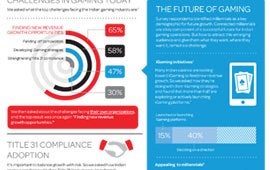Respond to Complex Compliance Requirements without Impacting the Customer Experience
Capture a More Complete View of Customer and Third-Party Risk
In today’s world of evolving Financial Crime Compliance expectations, knowing exactly who you are doing business with has never been more important. Our integrated financial crime and anti-money laundering (AML) compliance solutions deliver a more complete view of consumer and business risk that enables you to quickly focus resources on relevant financial crime risk. Improve investigation precision and achieve more effective, end-to-end global financial crime compliance.
Our solution combines advanced analytics and unmatched global identity intelligence with innovative financial crime technologies like machine learning, artificial intelligence (AI) and technology automation.
We deliver precise risk perspective that enables your business to efficiently recognize relevant risk and complete critical financial crime compliance processes including:
 |
Customer Identification Program (CIP) |
 |
Customer Due Diligence (CDD) |
 |
Know Your Customer (KYC) |
 |
Customer and Vendor Risk Assessment |
 |
Third-Party Vetting |
 |
Watchlist Screening |
| Trade Compliance | |
 |
Ongoing Monitoring and Financial Crime Risk Management (FCRM) |
Efficiently Assess Financial Counterparty Risk
Fortify Compliance Efforts Without Adding Friction to the Customer Experience
We offer financial crimes solutions that work together to deliver robust risk perspective that enables your business to prioritize key sanctions and global financial crime compliance requirements around:
By providing structured global risk intelligence in easy-to-utilize formats, our financial crime services help your business conform with key components of anti-terrorism and money laundering laws, including:
- USA PATRIOT Act
- Financial Crimes Enforcement Network (FinCEN) Customer Due Diligence Guidance
- Office of Foreign Assets Control (OFAC) Regulations
- Fifth European Union Anti-Money Laundering (EU AML) Directive
- Financial Actions Task Force (FATF) and Wolfsberg Group Guidance
- Monetary Authority of Singapore (MAS)
- Accounting and Corporate Regulatory Authority (ACRA) Act

Access Current Global Risk Intelligence and Improve Decisioning Efficiencies
Change is the only constant in the evolving climate of global financial crimes compliance requirements and ongoing geopolitical challenges. LexisNexis® Risk Solutions connects your business to comprehensive global risk intelligence that is continuously updated to reflect the most recent global risk realities. We offer an expansive breadth and depth of financial crime risk data in our comprehensive coverage of over 5 million structured profiles of individuals and entities that cover more than 60 risk categories and subcategories, including global sanctions, enforcement actions, Politically Exposed Persons (PEPs), state-owned enterprises, registration lists and adverse media.
We blend leading financial crime technology with human intelligence to deliver robust, yet structured global risk intelligence in a concise, curated format that can be used to automate decisioning and accelerate key elements of screening, due diligence and investigative workflows. Our financial crime solutions connect your business to continuously updated global risk intelligence to help ensure you stay ahead of emerging threats and support more effective management of complex financial crime regulations. We have also been named a Category Winner for Financial Crime Data in Chartis Research’s RiskTech 100 Study.
Achieve More Effective Financial Crime Risk Management
Our end-to-end, agile solutions are designed to enhance workflows across the customer lifecycle without disrupting day-to-day business. Our financial crime and compliance management solutions combine comprehensive global identity intelligence, cross-industry analytics, intuitive linking and innovative technologies to help your business effectively determine and prioritize relevant customer risks and utilize critical resources more efficiently:
- Enhance Customer Lifecycle Management (CLM)
- Comply with evolving global requirements and sanctions regulations
- Increase investigation accuracy
- Improve cross-enterprise operational efficiencies
- Strengthen Customer Data Management (CDM)
- Achieve greater cost synergies
- Avoid emerging financial crime risks
Confidently Balance Compliance Objectives With Core Business Operations

These integrated, configurable financial crime solutions work together to enable your business to maximize efficiencies across risk assessment, decisioning and investigations and support consistency across critical workflows. We deliver actionable intelligence to automate risk decisions and reduce delays and friction for legitimate customers. With agile financial crime solutions that can be tailored to meet specific risk tolerances, we can improve cross-enterprise operational efficiencies and cost synergies. Our robust financial crime solutions enable you to confidently complete risk-based assessments while balancing compliance demands with core business operations:
- Respond to evolving global compliance regulatory requirements
- Increase the transparency of compliance activities across the enterprise
- Expand into new markets and maximize global opportunities
- Minimize friction and speed onboarding for new customers and third-parties
- Control financial crime and compliance costs
Count on an Industry-Proven Source for Stronger Financial Crime
Risk Management and Compliance

7 out of 10

Top 50

140+ billion
Our FCRM solutions connect your business to robust technology, data and analytics that can transform your Financial Crime Compliance workflows and help you achieve greater costs and operations efficiencies across the customer lifecycle. Our one-source model encompasses all of your screening, investigation and ongoing monitoring needs to support a unified, more cohesive workflow – enabling you to focus resources on your core business and the customer experience.
With over 20 years of experience, we demonstrate our strong strategic commitment to fighting financial crimes including money laundering, bribery and corruption and terrorist financing. We are proud to be the provider of choice for leading global financial institutions and corporations that include seven of the world’s top ten banks, the top 50 banks in the U.S. market, and we enabled over 140 billion sanction screens in 2019.
Focus Resources on Relevant Financial Crime Risk and Improve Investigation Precision
 A powerful combination of industry-proven technology, advanced analytics, expansive global risk intelligence and unmatched industry experience enables your business to achieve a more effective end-to-end financial crime compliance workflow. We offer integrated and flexible tools and AML compliance solutions that support streamlined Financial Crime Compliance, economic sanctions compliance, Bank Secrecy Act and anti-money laundering compliance and anti-bribery and corruption compliance across the customer lifecycle.
A powerful combination of industry-proven technology, advanced analytics, expansive global risk intelligence and unmatched industry experience enables your business to achieve a more effective end-to-end financial crime compliance workflow. We offer integrated and flexible tools and AML compliance solutions that support streamlined Financial Crime Compliance, economic sanctions compliance, Bank Secrecy Act and anti-money laundering compliance and anti-bribery and corruption compliance across the customer lifecycle.
Count on LexisNexis® Risk Solutions to help your business efficiently understand customer and third-party risk and increase the effectiveness and efficiency of critical financial crime and compliance management workflows.
Discover how our financial crime compliance solutions support compliance across the customer and vendor lifecycle.
Know Your Customer and Due Diligence
Understand risk in your new relationships and ensure compliance with KYC regulations--
without slowing onboarding.
Watchlist Screening
Screen customer records against a broad range of watchlists to mitigate risk and maintain compliance.
Customer Identification Program
Confirm the legitimacy of customer identities. Fulfill CIP requirements and enhance the accuracy of downstream compliance.
Customer and Vendor Risk Management
Understand the direct and indirect risks associated with a customer or supplier.
Trade Compliance

AML Transaction Monitoring
A comprehensive approach leads to greater FCC & FCRM success
We believe in the power of data and analytics
to manage risk & uncover opportunity.
Products You May Be Interested In
-
AML Insight™
Protect against money-laundering, fraud and non-compliance
Learn More -
Automated Risk Assessment for Financial Crime Compliance
Automate identity matching and compliance decisions with LexisNexis® Automated Risk Assessment
Learn More -
Blue Sky Permit Administration and Private Offering
Navigate complex Blue Sky compliance requirements with our admin and private offering services
Learn More -
Bridger Insight® XG - OFAC Software
Streamline regulatory compliance, protect your business and increase revenue
Learn More -
Business Assurance Report
Access Critical Business Intelligence and Nationwide Courthouse Coverage
Learn More -
Business Data Enrichment Suite
Optimize customer data to identify opportunities and avoid risk
Learn More -
Due Diligence Person Report
Raise the effectiveness of critical due diligence workflows with targeted illustrative reports
Learn More -
Financial Crime Digital Intelligence
Reduce financial crimes compliance risk with LexisNexis® Financial Crime Digital Intelligence
Learn More -
InstantID®
Complete identity verification, spot fraud and uncover identity discrepancies in real time
Learn More -
InstantID® Business
Verify the business and its authorized agents... without awkward pauses
Learn More -
Intelligent Match Decision Solution
Reduce costs and increase the efficiency associated with regulatory compliance
Learn More -
LexisNexis® Client Lifecycle Management
Increase effectiveness with an innovative, end-to-end global KYC and CDD system in a single platform
Learn More -
LexisNexis® Compliance Lens
Transform the way you conduct AML screening
Learn More -
Relationship Identifier
Identify undisclosed relationships between individuals and businesses
Learn More -
Verification of Occupancy
Protect your portfolio while preserving profitability
Learn More -
WorldCompliance™ Data
Robust databases of high-risk individuals and entities
Learn More -
WorldCompliance™ Online Search Tool
One-stop Sanctions, PEPs and Adverse Media solution
Learn More









